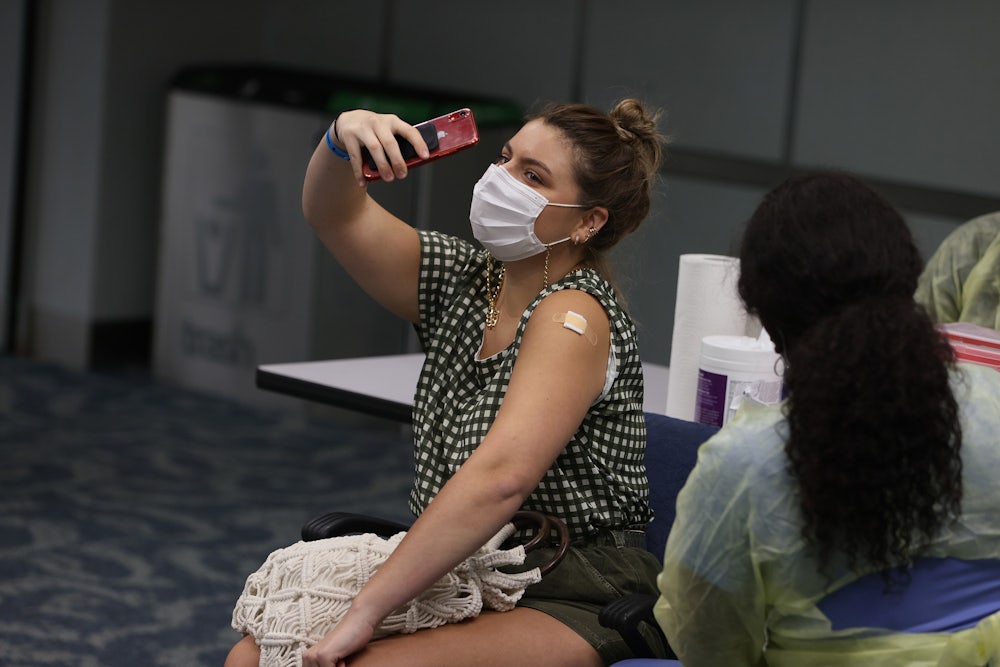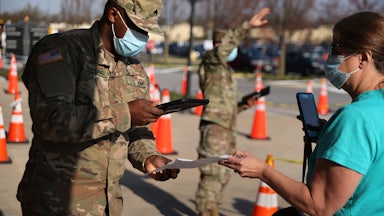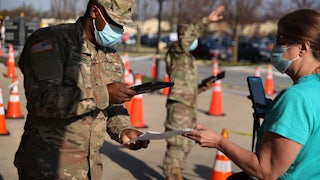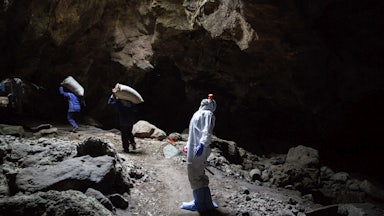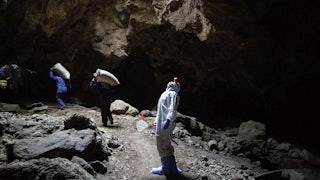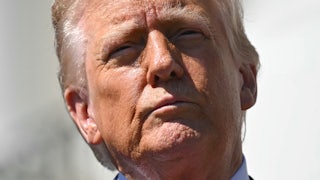This week, Pfizer released early results showing that a third dose of its Covid-19 vaccine with BioNTech can dramatically increase antibody levels several months after vaccination, particularly among older people. A third Pfizer-BioNTech vaccine shot, in other words, could help some people fight off the delta variant, the pharmaceutical company told investors. Pfizer plans to file for an emergency use authorization for a third dose in “coming weeks,” a spokesperson told me.
The news followed the revelation from U.S. health officials on Tuesday that some fully vaccinated people who become sick with the delta variant may be just as infectious as unvaccinated people, based on the so-called viral load in their samples. The U.S. Centers for Disease Control and Prevention promptly reversed course on its masking guidelines to recommend vaccinated people still wear masks in some circumstances.
Figuring out whether another vaccine dose is a good idea, however, is far from simple. It’s normal for antibodies to begin fading after a few months, and that doesn’t mean the vaccines aren’t working well. It’s also not clear how the CDC counts viral loads among so-called breakthrough cases—i.e., vaccinated people who get sick with Covid. Because the CDC is tracking only breakthrough cases resulting in hospitalization or death, it’s likely they are talking about high viral loads among the seriously sick, not asymptomatic or mildly symptomatic cases. Cases of fully vaccinated people getting that sick are still rare, often occurring among a very small group of immune-suppressed people. They might indeed benefit from another dose. That doesn’t mean everyone else should line up for an additional dose, too.
Two things are true at once: first, that the delta variant and future variants are an urgent threat that people should be taking seriously and, second, that the vaccines continue to be very effective. As the world continues battling Covid surges and the virus continues evolving, we may eventually need boosters. “The big concern is that the next variant that might emerge—just potentially a few mutations away—could evade our vaccine,” Dr. Rochelle Walensky, director of the CDC, said on Tuesday. But there’s no evidence that another shot is necessary for the vast majority of people. Hoarding vaccines when many health workers and vulnerable people elsewhere haven’t even gotten their first doses would be a major misstep, hampering our ability to forestall new variants and end the pandemic.
When Pfizer first made headlines by announcing it would apply for an emergency use authorization for a third dose of its Covid-19 vaccine, U.S. health officials quickly responded that there’s no evidence a booster is needed. The World Health Organization roundly condemned the idea of a third shot for wealthy countries when so many vulnerable people in other countries still haven’t gotten their first shots.
The delta variant, as predicted, has quickly become the dominant variant in the United States and the world. But so far, the vaccines continue to work very well when it comes to preventing severe illness and death—which is what they were designed to do. In the U.S., 97 percent of hospitalizations and 99.5 percent of deaths are still among the unvaccinated. Health officials have focused their attention on reaching those who have not yet gotten vaccinated, which is still one of the best ways to battle the delta spike.
“It’s a vaccine that continues to work very well,” Dr. Paul Offit, director of the Vaccine Education Center at Children’s Hospital of Philadelphia and a member of the Food and Drug Administration’s vaccine advisory committee, told me. The highly contagious delta variant is causing a slight dip in the effectiveness of vaccines, falling from 94 to 88 percent, according to data from the U.K. While Pfizer argues that immunity seems to wane after six months and a third dose can significantly increase antibodies, high levels of antibodies aren’t the only or even the best way to judge protection from illness. In fact, antibodies are a temporary response to being sick; if we kept antibodies from every virus we battled in our bloodstream, our blood would resemble sludge. Instead, we have much longer-lived immunological memory cells that take over and spring into action when they encounter a virus our body remembers.
Most vaccinated people still have excellent protection from getting and, to some degree, from spreading the virus, Offit said. Tuesday’s news from the CDC doesn’t change this fact, he wrote me in a follow-up email. “While it is true that people who are vaccinated could shed as much virus in an asymptomatic infection as those who aren’t vaccinated, it’s still very uncommon.”
Cases of asymptomatic or mild infection are expected for these kinds of viruses, Offit said, because “it’s much easier to protect against severe and critical disease than it is to protect against asymptomatic infection and mildly symptomatic infection. And I suspect that would be fairly long lived,” he said.
So far, researchers haven’t identified reliable correlates of protection—markers in the bloodstream that would tell us when protection from the vaccines has actually faded. The closest proxies we have, Offit said, aren’t antibodies but rather hospitalizations and deaths, which remain low among vaccinated people.
But there’s a very small number of people—less than 3 percent of Americans—who would likely benefit from another dose: the immune-suppressed.
Last week, members of the CDC advisory committee on vaccines met to discuss the potential benefits of a third dose among patients with organ transplants, those who are undergoing or recently finished treatment for cancer, and patients with untreated HIV, among others. Growing evidence shows that many of these patients aren’t able to mount a strong immune response to typical Covid vaccination, but a third dose of mRNA vaccines or a second dose after the Johnson & Johnson shot seems to help enormously.
“In immunocompromised populations … we do see breakthrough infections in people who are considered well-vaccinated,” Dr. Camille Kotton, the clinical director of transplant and immunocompromised host infectious diseases at Massachusetts General Hospital and an associate professor at Harvard Medical School, told me. “We have seen numerous immunocompromised hosts have significant hospitalizations and major morbidity and mortality from Covid-19.” In fact, 44 percent of hospitalized breakthrough cases in the U.S. are among immunocompromised people.
It makes good sense to offer third doses to this very small group of people who aren’t able to mount a strong response to the first two shots, Kotton, who is on the CDC’s vaccines advisory committee, said. “We have a good vaccine supply, this is a small percent of the population, it will likely be just one additional dose of vaccine. So it does not seem like a daunting task.”
France started offering third shots for immunocompromised people in April, and Israel began doing the same earlier this month. On Monday, Israel’s Health Ministry Director-General Nachman Ash said the country was also weighing third doses for people over 60, although no decision has been made yet. Some older people may also generate a weaker immune response—but vaccinating all older people for a third time could significantly cut into global vaccine supply at a time when global coverage is crucial. And we don’t know yet how prevalent this weaker immune response among older people may be.
In the meantime, it’s important for everyone else not to rush out and get a third shot, Kotton said. “I know that people are taking matters into their own hands, which I find somewhat daunting because they aren’t doing it under any kind of medical monitoring, and if anything were to happen to them—they’re just not being monitored,” she said. “It’s a challenging situation.”
Because the vaccines, even at their current one- or two-dose regimen, aren’t fully approved by the FDA yet, the committee can’t make recommendations on additional doses yet. Kotton hopes the FDA will either offer full approval or amend the existing EUA to allow for additional doses in specific circumstances.
The FDA, which still has no leader named by the Biden administration, recently approved Aduhelm, a controversial Alzheimer’s medication with unknown effectiveness. It also recently approved a shingles shot for immunocompromised patients without robust data in all populations, Kotton pointed out. “Yet they haven’t approved the Covid vaccines, even with hundreds of millions of doses given, and a worldwide pandemic, with many Americans still reluctant to take a vaccine until it’s FDA approved. So I would really encourage the FDA to evaluate what they are approving and what they have not yet approved, and think about the ability to save lives,” she said, “especially with the rise in the delta variant, and a real flare in infections nationally.”
Health experts are still focused on getting first and second doses to those who need them. “The most important thing for everyone else to do, who hasn’t been vaccinated, is to go out and get vaccinated. We know it provides long-lasting protection against any variant that’s out there right now,” Dr. Alok Patel, a pediatric physician at Stanford Children’s Health, told me. “The average person should feel protected if they’ve gotten vaccinated.”
The WHO was scathing in its critique of producing third shots for some when so few people have had one. “We will look back in anger, and we will look back in shame if we don’t now move to use the increasing production capacity that is coming online,” said Dr. Mike Ryan, executive director of the WHO Health Emergencies Programme, “to protect the most vulnerable, protect the frontline health workers around the world.”
Instead of planning for widespread third doses, Patel said, the U.S. should send any excess doses to countries that desperately need them. “The wealthiest nations in the world have an overabundance of vaccine supply, and there’s evidence that the United States has millions, if not hundreds of millions, of vaccines on top of what’s needed for all their citizens,” Patel said. In addition to tragically unnecessary hospitalizations and deaths that come from not being vaccinated, he said, having huge swaths of unvaccinated people will also give rise to new variants. “There is no way to beat this pandemic by purely looking on a domestic level. We need to do it on a global level. We’re doing ourselves a disservice by not actually paying attention to global vaccine equity,” Patel said.
